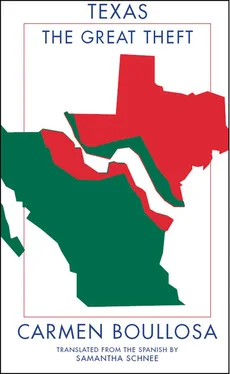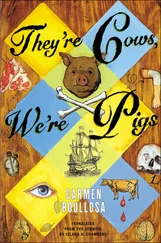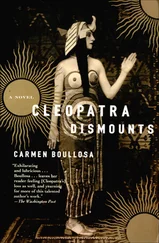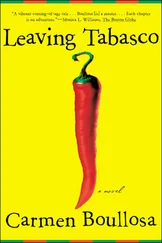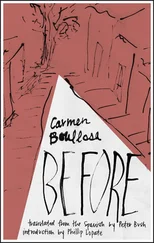Gómez, the mayor’s assistant, has no sooner heard Doctor Velafuente’s news than he wants to go directly to tell his boss, but first he must hurry to deliver a “personal and confidential” message for Matasánchez’s new jailkeeper.
He delivers the message and the news about Shears’ phrase as well. It’s received quite differently than it was in Bruneville’s jail. Here there’s only one prisoner, not a prize catch, like Urrutia on the other side of the river; however, in the presidio on the outskirts of Matasánchez, there are scores of prisoners, among whom there are at least a half-dozen big fish.
This solitary prisoner is from the north. He’s a Comanche called Green Horn. Captain Randolph B. Marcy (one of the good gringos) brought him in and accused him of torturing a Negro girl named Pepementia, who is no longer a slave under Mexican law.
Captain Marcy recognized Green Horn in Matasánchez one day, seized him on the spot, and took him directly to the authorities.
In his defense, Green Horn said in perfect Spanish (he speaks several languages): “We did it solely out of scientific interest. We wanted to see if they’re as black on the inside as they are on the outside; that’s why we were peeling back and scrutinizing her layers of skin and muscles.”
Gutiérrez, a lawyer known for his guile and his profitable connections in the Comanche slave trade, is defending Green Horn.
It would have been impossible for Captain Marcy to bring charges in Bruneville, or any other city in American territory, but in Mexico he knew the authorities would take it to heart.
Green Horn is being kept in the jail at the center of town because the presidio — from which it’s impossible to escape — is on the outskirts and vulnerable to Comanche raids.
When Green Horn hears the news of the Shears-Nepomuceno affair, he thinks that the gringos will ride into Matasánchez in reprisal and liberate him from “these disgusting meals and salsas, these flatulent greasers.” He has to restrain himself from breaking into song.
The jailkeeper — who doesn’t have an official title — is a friend of Carvajal, Nepomuceno’s political rival; he has many reasons to rejoice:
1At last he has something to distract him from his boredom.
2The position he’s been given by the mayor is humiliating — he’s no more than a security guard, a lowly post unbecoming to a man of his lineage, but he needs the money. “If I’d bought land to the north of the river when the time was right, I’d be set for life” (which, given the gringo takeover, is not true).
3He thinks he’s finally got his shot at glory; he’s always been on the sidelines when things happen, but not this time, he’s in the jailhouse and something big’s going to happen here.
The jailkeeper caresses the pistols in his holsters.
No one remembers his name.
His duty done, Gómez, the mayor’s assistant, returns to the office. He arrives to find his boss, Don José María, whose famous family’s surname has been popularly replaced by “de la Cerva y Tana” (meaning “blow gun”, a nickname that mocks his inability to open his mouth without spitting verbal bullets at people), carrying an envelope bearing the central government’s seal. Upon hearing the news about Shears the mayor tears the letter open and tosses it onto his desk, unread, and begins to rant and rave as usual, while folding the envelope over and over again, as though it were the envelope’s fault:
He curses Gómez for bearing the news.
He curses Bruneville.
He curses Shears: “Idiot, good-for-nothing, doesn’t even know how to hammer a nail.”
He curses Lázaro Rueda for being drunk: “Booze isn’t good for him, the violin, on the other hand …”
He curses up and down, left and right.
When he’s vented this string of insults he asks loudly, “And now what are we supposed to do? There’s no doubt that Nepomuceno will retaliate, and how! Where does this leave the rest of us?”
The letter lies on his desk, still unread. It’s signed by Francisco Manuel Sánchez de Tagle. It says, in large, clear letters:
I RECOMMEND THAT THE NEGRO FUGITIVES FROM THE UNITED STATES REMAIN IN THE CITIES ALONG OUR NORTHERN BORDER, AS MUCH TO PROVIDE LODGING FOR THEM WITH DIGNITY AS BEFITS ANY MEXICAN CITIZEN, AS TO PROTECT OUR COUNTRY FROM AMERICAN RAIDS.
In the courtyard of Aunt Cuca’s house, Catalino changes the message tied to another pigeon, Mi Morena, and sets her flying southward.
Mi Morena arrives in the camp of the Seminoles (or Mascogos, as the Mexicans call them). The message is handed immediately to Wild Horse, the chief, and to Juan Caballo, the leader of the fugitive African slaves, an ally of Wild Horse from long before their sojourn south of the Río Bravo.
The message makes the Seminoles anxious. It reawakens their worst fear: the frontier may no longer provide protection against the gringos.
“We left everything we knew,” says Wild Horse, “to escape from the White Cholera. We bade goodbye to the buffalo, the plains, the birds and their songs. Now we risk our lives living in caves where moss grows on our clothes, beneath an unknown sky where no ducks fly, in stagnant air that reverberates with the sounds of unknown insects, on unforgiving land, just to get away from the gringos. Have we changed our world for nothing, only to suffer them again?”
The members of the camp wail and beat their chests. In a few hours they send Mi Morena back. She returns to Matasánchez without a message.
They send their message to Querétaro, via Parcial, Juan Caballo’s pigeon, who flies off. If we were to wait for him to arrive we’d lose the thread of our story, so we’ll leave it there and go back to the Valley of the Rio Grande, the prairie, Indian Territory.
Nicolaso writes out copies of the phrase and entrusts them to several pigeons. We saw the first one fly to Matasánchez with Favorita. The second travels northward on the feet of Hidalgo, the white pigeon. On the Pulla cotton plantation a young mulatto (son of Lucie, the slave they say was mistress to Gabriel Ronsard, the café owner) receives the pigeon, scratches his crotch, and reads the message aloud. The overseer scratches his head and listens. The Negros under his supervision listen, too, scratching their chests and necks in front of a small group of Indians who have come to trade — they’ve brought two tame mustangs they want to exchange for bullets and cotton, which they’ll take back to Indian Territory and exchange for prisoners.
The Indians don’t itch themselves now — the Pulla plantation is infested with fleas — but they’ll be itching later, after they bring the bug-ridden cotton home with them.
For the cautious, vindictive foreman the news is of little interest, no matter how he looks at it he can’t see why it matters.
For the Negros it’s downright scandalous. Nepomuceno is a living legend. According to local lore he was kidnapped by Indians as a boy, an unfounded rumor that was spread by El Tigre, the runaway slave from Guinea who was captured by the Comanches and returned to his owner for a handsome reward. A good-looking, healthy, young Negro with strong teeth who could read and write, he was clean, conscientious, and hard-working, worth his weight in gold. From the day of his arrival he has told stories, many untrue, about Nepomuceno.
Having been kidnapped isn’t the only reason Nepomuceno is a living legend. It’s the stories about his riding, cattle-rustling, skirt-chasing, and fighting, along with his unparalleled roping skills and having been born into money, that make him a living legend; cowards fear him and women dream about him for good reason. There’s no one like Nepomuceno — who’s also a redhead, according to some.
Читать дальше
